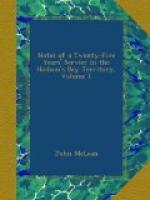Of all the Indians I have seen, the Nascopies seem most averse to locomotion; many of them grow up to man’s estate without once visiting a trading post. Previously to the establishment of this post they were wont to assemble at a certain rendezvous in the interior, and deliver their furs to some elderly man of the party, who proceeded with them to the King’s posts, or Esquimaux Bay, and traded them for such articles as they required. So little intercourse have this people had with the whites, that they may be still considered as unsophisticated “children of nature,” and possessed, of course, of all the virtues ascribed to such; yet I must say, that my acquaintance with them disclosed nothing that impressed me with a higher opinion of them than of my own race, corrupted as they are by the arts of civilized life.
The Nascopie freely indulges all the grosser passions of his nature; he has no term in his language to express the sensation of shame; the feeling and the word are alike unknown. Many circumstances might be adduced in proof of this, but I have no desire to disgust the reader. Previously to our arrival here, there was not such an article of domestic utility known among them as a spoon; the unclean hand performed every office. They take their meals sitting in a circle round a kettle, and commence operations by skimming off the fat with their hands, and lapping it up like dogs; then every one helps himself to the solids, cutting, gnawing, and tearing until the whole is devoured, or until repletion precludes further exertions, when, like the gorged beast of prey, they lie down to sleep.
The Nascopies practise polygamy more from motives of convenience than any other—the more wives, the more slaves. The poor creatures, in fact, are in a state of relentless slavery; every species of drudgery devolves upon them. When they remove from camp to camp in winter, the women set out first, dragging sledges loaded with their effects, and such of the children as are incapable of walking; meantime the men remain in the abandoned encampment smoking their pipes, until they suppose the women are sufficiently far advanced on the route to reach the new encampment ere they overtake them.
Arrived at the spot, the women clear the ground of snow, erect the tents, and collect fuel; and when their arrangements are completed, their lords step in to enjoy themselves. The sole occupation of the men is hunting, and, in winter, fishing. They do not even carry home the game; that duty also falls to the lot of the female, unless when the family has been starving for some time, when the men condescend to carry home enough for immediate use.
The horrid practice still obtains among the Nascopies of destroying their parents and relatives, when old age incapacitates them for further exertion. I must, however, do them the justice to say, that the parent himself expresses a wish to depart, otherwise the unnatural deed would probably never be committed; for they in general treat their old people with much care and tenderness. The son or nearest relative performs the office of executioner,—the self-devoted victim being disposed of by strangulation.[1] When any one dies in winter, the body is placed on a scaffold till summer, when it is interred.




